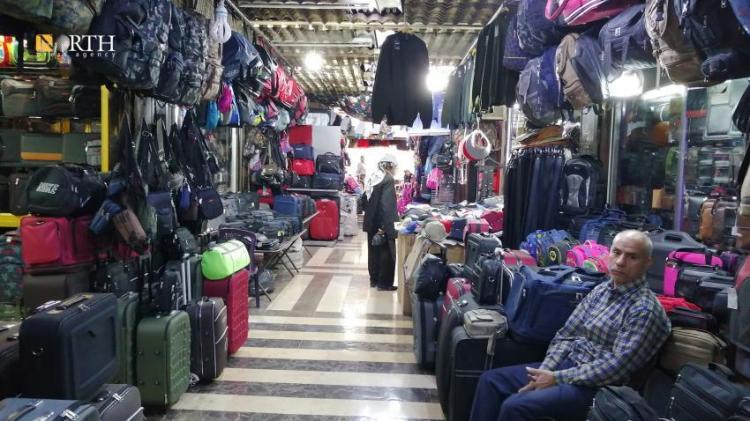Souq Al-Khaja in Damascus maintained its activities despite the years of war
Damascus – North-Press Agency
Safaa Amer
The Syrian war reflected negatively on the various economic activities in the country, so many factories were destroyed, and many markets were closed, but this did not apply to Souq al-Khaja, which is a market specialized in selling bags in the heart of the Syrian capital, Damascus
.
Dozens of bags of attractive colors, shapes and sizes are arranged in an artistic manner and hanged on the storefront or on a table in front of the shops, where its forms and prices attract those who go to al-Khaja market.
The market was built like any other specialized market in Damascus along the western wall of the Citadel of Damascus. Since its establishment in the late nineteenth century, it has specialized in selling leather products.
Souq al-Khaja was established by a person named Ragheb bin Rashid al-Khoja and the market was named after him. Souq al-Khaja was established by a person named Ragheb bin Rashid al-Khaja and the market was named after him. Al-Khoja built the market in the style of Souk al-Hamidiya on two floors. The upper floors include handicraft workshops for leather manufacturers, and the lower floors are shops that sell the products of these workshops. In 1905, the market was renovated, covered with an iron roof, in order to protect it from fire.
Souq Al-Khaja was distinguished by its four entrances, one of which opens to Souq al-Hamidiyeh, the second to Souq al-Nahhasin, the third to the gate of Citadel of Damascus, and the fourth to the historic Sanjakdar mosque.
Later, as part of a project to restore and reveal the huge fortress of Damascus and reveal its western wall and trench, an alternative market similar to the old one with the same name was created, at a place only 300 meters far from the place of the old market in al-Thawra Street, near the historic Sarouja neighborhood.
Mohamed Salah, an owner of a store in Souq al-Khaja started his talk with North-Press by saying: "Bags are a source of livelihood and I was brought up beside the machine.” He inherited the profession from his father and grandfather, who worked for years before him in the market, where he said: “When it comes to bags, there is no reason to think because the market of al-Khaja is available at cheaper prices than other markets.”
Rama al-Hafiz, a customer of Mohammed's store said: "Nowadays, lots of shops attract the buyer to buy bags for any purpose whatsoever, but what distinguishes al-Khaja is the attractiveness of the way the bags are displayed as their prices close to the wholesale price, also the ability to request the design chosen by the customer for any bag from the workshops.”
At the back of the market, there are shops for repairing bags, and their owners consider that the process of repairing bags is much more profitable than manufacturing them. "We only need a sewing machine and some simple tools," the shop owners said.
The market witnessed an active purchase movement during the previous years in an unprecedented way due to the large movement of travel and transportation by the Syrians, which raised the demand for all types of bags.

